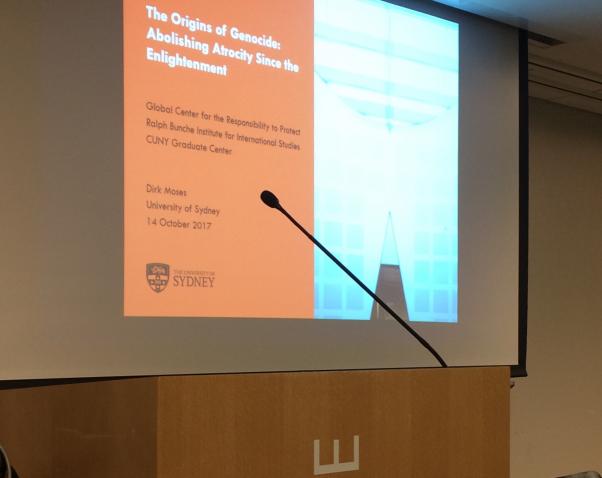17 November 2017 — The Origins of Genocide: Abolishing Atrocity since the Enlightenment was the topic of a lecture given by Dirk Moses, Professor of Modern History at the University of Sydney, on Tuesday, 14 November 2017 at the CUNY Graduate Center in New York. The talk focused on the evolution of the vocabulary used to denounce mass atrocities from the sixteenth century onward.
The speaker asserted that the word genocide is rarely used by the United Nations to characterize human rights violations. Rather, designations such as crimes against humanity and war crimes are more likely to be used by the Organization. The last time a genocide was officially recognized as such was in June 2016, when the United Nations Commission of Inquiry on Syria urged the international community to stop the mass killings against the Yazidi religious minority in Syria and Iraq.
Article II of the Convention on the Prevention and Punishment of the Crime of Genocide defines genocide as any of the following acts committed with intent to destroy, in whole or in part, a national, ethnical, racial or religious group, as such: (a) Killing members of the group; (b) Causing serious bodily or mental harm to members of the group; (c) Deliberately inflicting on the group conditions of life calculated to bring about its physical destruction in whole or in part; (d) Imposing measures intended to prevent births within the group; (e) Forcibly transferring children of the group to another group.
Prof. Moses contended that the language of transgression—meaning expressions that shock the conscience of mankind or such phrases as unprecedented atrocities and unmentionable crimes—which is used to make sense of mass killings has for the most part remained unvaried since Bartolomé de las Casas published A Short Account of the Destruction of the Indies in 1552. This discursive framework can also be found in writings by eighteenth-century English humanitarians discussing slavery as well as in the work of Raphael Lemkin, who coined the term genocide in the early 1940s.
The speaker distinguished how mass atrocities have been talked about and understood before the Second World War and then afterwards. With regard to the United Nations Convention on the Prevention and Punishment of the Crime of Genocide, he observed that the term political group did not constitute a recognized category in Article II. He contended that a moral hierarchy had arisen after the Second World War determining what particular case of mass atrocity would likely capture public attention. Prof. Moses lamented that deportation and colonialism could endure for decades without shocking the conscience of the world.
The ensuing discussion was led by Simon Adams, Executive Director of the Global Centre for the Responsibility to Protect, who reflected on the almost magical properties of the term genocide that inform how people employ it. Questions from the audience touched upon recent cases of mass killings which might be thought to qualify as genocidal.

